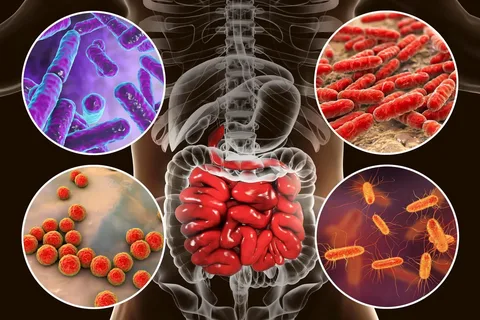A recent preclinical study published in Cell Host & Microbe by researchers at Weill Cornell Medicine sheds new light on the gut microbiota’s role in influencing hosts’ metabolism. The findings suggest that gut microbes act as an auxiliary liver, significantly altering amino acid and glucose metabolism in their hosts.
Senior author Dr. Chun-Jun Guo, an assistant professor of microbiology & immunology in medicine and a member of the Jill Roberts Institute for Research in Inflammatory Bowel Disease at Weill Cornell Medicine, aimed to explore how essential gut microbes influence their hosts’ access to nutrients derived from food.
Dr. Guo explained, “These microbes consume nutrients before we do, leaving us with the remaining nutrients after they have satisfied their own needs.”
To investigate this process, first author Dr. Ting-Ting Li, a postdoctoral associate in the Guo lab, and collaborators assessed the efficiency of various human gut commensals in depleting amino acids. After screening over 100 different gut microbes, the team identified several highly efficient bacteria in metabolizing dietary amino acids. When these microbes colonized the gastrointestinal tracts of germ-free mice, the levels of those amino acids dropped in both the host’s intestine and bloodstream.
The researchers then identified the specific bacterial metabolic genes responsible for depleting amino acids. They discovered that one bacterium contained over 20 different genes encoding similar enzymatic functions. With improved CRISPR-Cas9 gene deletion techniques for gut bacteria, the team was able to perform a large gene deletion screen and identify the metabolic genes in the bacteria responsible for depleting amino acids.
The scientists then took their findings from cultured cells to animals, giving germ-free mice genetically modified strains of bacteria one at a time. Dr. Guo stated, “We can now precisely manipulate individual genes for depleting amino acids in the gut, allowing us to assess the individual function of these genes and their impact on host amino acid homeostasis.”
The team’s findings revealed a surprising result: Gut microbes can alter their hosts’ blood glucose homeostasis by consuming a specific class of amino acids. Further analysis showed that by changing amino acid availability, the microbes affect the production of the neurotransmitter serotonin, which in turn influences glucose regulation.
Dr. Guo commented, “Many of these metabolic functions can be done by the liver, but now we’ve found that there are functionally comparable enzymes encoded by the gut microbiota that can do the same or similar things. It’s like there is a second liver operating in the gut.”
The team is now designing new strategies to more precisely modulate bacterial enzymes and exploring how various combinations of bacteria affect the host’s amino acid metabolism. Additionally, some of the same genes identified in the study are dysregulated in the gut microbiomes of patients with digestive and metabolic diseases. Targeted drugs or engineered strains of bacteria could potentially provide new ways to treat such conditions.
Dr. Guo concluded, “These metabolic genes might be potential biomarkers for diseases like type 2 diabetes or inflammatory bowel disease, and they are also potential treatment targets. Our research demonstrates the possibility of precisely manipulating gut microbiota to regulate host metabolism and improve host metabolic functions.”
*Note:
1. Source: Coherent Market Insights, Public sources, Desk research
2. We have leveraged AI tools to mine information and compile it




